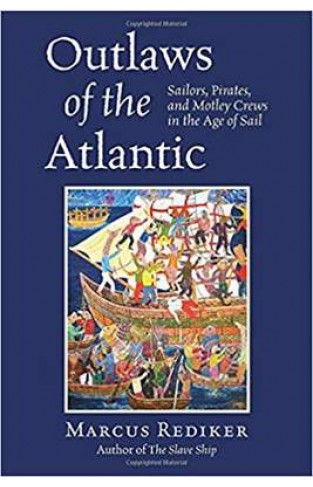Outlaws of the Atlantic Sailors Pirates and Motley Crews in the Age of Sail
By: Marcus rediker
-
Rs 1,610.75
- Rs 1,895.00
- 15%
You save Rs 284.25.
Due to constant currency fluctuation, prices are subject to change with or without notice.
This maritime history "from below" exposes the history-making power
of common sailors, slaves, pirates, and other outlaws at sea in the era
of the tall ship.
In Outlaws of the Atlantic,
award-winning historian Marcus Rediker turns maritime history upside
down. He explores the dramatic world of maritime adventure, not from the
perspective of admirals, merchants, and nation-states but from the
viewpoint of commoners sailors, slaves, indentured servants, pirates,
and other outlaws from the late seventeenth to the early nineteenth
century. Bringing together their seafaring experiences for the first
time, Outlaws of the Atlantic is an unexpected and compelling peoples history of the age of sail.
With his signature bottom-up approach and insight, Rediker reveals how
the motley that is, multiethnic crews were a driving force behind the
American Revolution; that pirates, enslaved Africans, and other outlaws
worked together to subvert capitalism; and that, in the era of the tall
ship, outlaws challenged authority from below deck.
By
bringing these marginal seafaring characters into the limelight, Rediker
shows how maritime actors have shaped history that many have long
regarded as national and landed. And by casting these rebels by sea as
cosmopolitan workers of the world, he reminds us that to understand the
rise of capitalism, globalization, and the formation of race and class,
we must look to the sea.
| Book | |
| What's in the Box? | 1 x Outlaws of the Atlantic Sailors Pirates and Motley Crews in the Age of Sail |
This maritime history "from below" exposes the history-making power
of common sailors, slaves, pirates, and other outlaws at sea in the era
of the tall ship.
In Outlaws of the Atlantic,
award-winning historian Marcus Rediker turns maritime history upside
down. He explores the dramatic world of maritime adventure, not from the
perspective of admirals, merchants, and nation-states but from the
viewpoint of commoners sailors, slaves, indentured servants, pirates,
and other outlaws from the late seventeenth to the early nineteenth
century. Bringing together their seafaring experiences for the first
time, Outlaws of the Atlantic is an unexpected and compelling peoples history of the age of sail.
With his signature bottom-up approach and insight, Rediker reveals how
the motley that is, multiethnic crews were a driving force behind the
American Revolution; that pirates, enslaved Africans, and other outlaws
worked together to subvert capitalism; and that, in the era of the tall
ship, outlaws challenged authority from below deck.
By
bringing these marginal seafaring characters into the limelight, Rediker
shows how maritime actors have shaped history that many have long
regarded as national and landed. And by casting these rebels by sea as
cosmopolitan workers of the world, he reminds us that to understand the
rise of capitalism, globalization, and the formation of race and class,
we must look to the sea.
Outlaws of the Atlantic Sailors Pirates and Motley Crews in the Age of Sail
By: Marcus rediker
Rs 1,610.75 Rs 1,895.00 Ex Tax :Rs 1,610.75
Zubin Mehta: A Musical Journey (An Authorized Biography)
By: VOID - Bakhtiar K. Dadabhoy
Rs 892.50 Rs 1,050.00 Ex Tax :Rs 892.50
The Origins of Political Order From Prehuman Times to the French RevolutioN
By: Francis Fukuyama
Rs 4,045.50 Rs 4,495.00 Ex Tax :Rs 4,045.50
Manning Up: How the Rise of Women Has Turned Men into Boys
By: Kay Hymowitz
Rs 845.75 Rs 995.00 Ex Tax :Rs 845.75
The Obama Syndrome: Surrender At Home War Abroad
By: Tariq Ali
Rs 1,100.75 Rs 1,295.00 Ex Tax :Rs 1,100.75
The Quest For Meaning: Developing A Philosophy Of Pluralism
By: Tariq Ramadan
Rs 1,185.75 Rs 1,395.00 Ex Tax :Rs 1,185.75
The Pakistan US Conundrum Jihadists The Military And The People The Struggle For Control
By: Yunas Samad
Rs 1,185.75 Rs 1,395.00 Ex Tax :Rs 1,185.75
An Enemy We Created: The Myth Of The Taliban Al Qaeda Merger In Afghanistan 19702010
By: Alex Strick van Linschoten
Rs 4,197.50 Rs 8,395.00 Ex Tax :Rs 4,197.50
WikiLeaks: Inside Julian Assanges War on Secrecy
By: David Leigh & Luke Harding
Rs 637.50 Rs 850.00 Ex Tax :Rs 637.50
No similar books from this author available at the moment.
DK Super Readers Level 3 Space Busters Race to the Moon
By: DK
Rs 1,075.50 Rs 1,195.00 Ex Tax :Rs 1,075.50
The Bad Day Book - For When Life Is a B*tch
By: Swan Huntley
Rs 2,965.50 Rs 3,295.00 Ex Tax :Rs 2,965.50
Zubin Mehta: A Musical Journey (An Authorized Biography)
By: VOID - Bakhtiar K. Dadabhoy
Rs 892.50 Rs 1,050.00 Ex Tax :Rs 892.50
Outlaws of the Atlantic Sailors Pirates and Motley Crews in the Age of Sail
By: Marcus rediker
Rs 1,610.75 Rs 1,895.00 Ex Tax :Rs 1,610.75














-120x187.jpg?q6)





-120x187.jpg?q6)



-120x187.jpg?q6)






